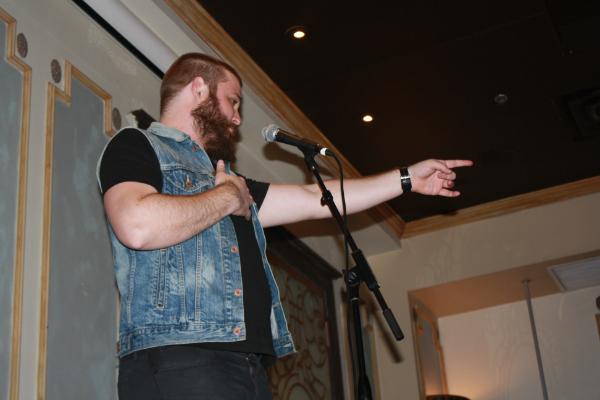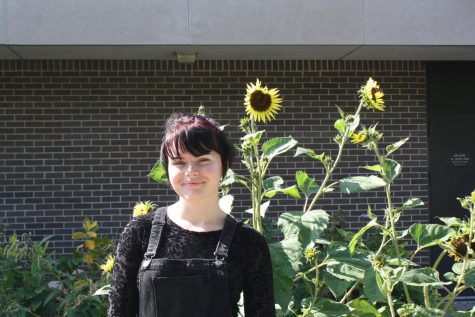Spoken word in classrooms creates a ‘Slamily’ for seniors
April 11, 2016
The audience’s chatter dimmed to murmurs as Alison Broere introduced herself as the director of SlamMN! and the emcee of the slam at Kieran’s pub in downtown Minneapolis, which is hosted every fourth Tuesday of the month.
The supportive mood was set as Alison encouraged the audience to snap and praise all the poets, especially those who made you feel intense emotion.
Erica Hoops, a sophomore at St. Olaf, began the slam first as a “sacrificial poet”: a poet who is not part of the competition, but presents first for the judges to calibrate. During the three rounds, the same five performers presented three different poems, with random audience members giving a score of 1-10.
Between the first and second round, a featured spoken word artist performed – this time it was Neil Hilborn, a nationally renowned slam poet noted for his poem, OCD, that has received over 11 million views on Button Poetry’s YouTube page. You could feel the emotion in the audience as people let out long-held breaths when each poem ended. The topics ranged from sexual abuse to gender identity to fetishizing of black women.
The competitive aspect of poetry slam is recognized as being constructive in poetry writing by many poets. “Being in slam is what motivates me to write more because I have a space to share it,” said Sarah Ogutu, a slam poet renowned for her feminist and black-empowering poetry. Slam poetry has a distinct energy to it that engages the audience not only visually, but emotionally as well.
“I’ve been affected by every slam poem I’ve heard in a way just because the art is so poignant that it’s hard not to be affected by it,” said Hoops. “Competition isn’t for everyone…for me, it really helped me to become a better communicator,” shared internationally-toured and two time nationally awarded slam poet Sierra DeMulder.
“[Slam poetry] requires that the author and performer actively engage with the audience that they try to be accessible and understood,” said Hilborn. He started participating in slams seven years ago when one of his best friends at Macalester introduced him to slam culture around the Twin Cities by bringing him to a variety of spoken word events.
Poems written for slams often differ from those written for more personal poems that won’t be shared publically. “Often there will be pieces in there where I say to myself: you know what, this is for me, this is what I was dealing with that I needed to think through and I’ve thought through it and I’m never gonna show this to anyone,” Hilborn said.
Hoops writes poetry more intentionally based on the audience: “When I write poetry for competition I definitely want it to be a certain way”. For some artists, the line between poetry shared versus kept personal is a thin one: “[For me] there’s not a lot of difference, however there are poems that are too personal,” DeMulder explained.
According to the poets, the slam poetry community is unique: “There’s the phrase of the ‘slamily’, and it’s really cliche but it’s kind of true.” said DeMulder, smiling. Many artists agree that even with its competitive aspect, the community remains a very supportive and accepting one.
“It’s very supportive… I mean there’s that competition aspect but I’ve never not been snapped for,” said Hoops. “It’s one of the most accepting communities I’ve ever been part of…[It] became the main community I was a part of and to this day it’s still the people I engage with the most,” explained Hilborn.

The spoken word community has struggles as well: inclusivity and understanding the hurdles many poets face. “[It] can be a little insular and you wanna make sure that you’re being welcoming,” explained DeMulder.
The competition aspect of slam can be discouraging at times if poets haven’t become accustomed to it. “If you’re a young new poet and your write your heart out and you go on stage and it doesn’t score well, it could feel like my story my experience is invalid and [yours] since [you’re] going on is more valid than mine,” explained Donte Williams, a slam poet who works with TruArtSpeaks and who is well-known locally in the Twin Cities and on social media.
At the slam I attended at Kieran’s Pub, Bridget Dugan and Gabby Granada were both first-time spoken word judges randomly selected in the crowd. “[They] came up to us and handed us a white board,” explained Dugan, chuckling. “I really liked [it], [it] seemed really supportive.” Granada explained she felt integrated into the community: “Now that I feel like I’m in it it’s awesome.” Both girls were smiling from excitement after a night of heartfelt poetry. “I would come down to another show,” said Granada.
South has been active in engaging students into spoken word through after school programs, workshops and a class – hARTs, taught by Ms. Lanik and Ms. Haug that features a unit dedicated to writing and performing spoken word. This year, the class was led with help of Tish Jones, a local spoken word artist who works at TruArt Speaks and Intermedia Arts.
“I’m in love with Tish,” said smiling senior Victoria Meyers. “It was really good because I hadn’t ever considered spoken word as something I’d dabble in…it was super enlightening to things I hadn’t realized I had been feeling,” added Meyers. The students performed their spoken word pieces on March 24th in the South auditorium. The topics varied from abusive relationships to police brutality to mental illness. Many of the poems were personally intimate and emotional, with many of the students tearing up. “Just writing about abuse and neglect, I was shaking and crying…It felt really good,” Meyers continued.
Tish Jones has been an active part of the Twin Cities spoken word movement for many years. She explained over an email interview that she started reading and writing poetry at a young age, and performed her first poem in elementary school. She has organized poetry slams on a statewide level since 2005, and is currently the director of 2016’s Brave New Voices, one of the world’s largest spoken word events that features over 600 youth from around the world.
There are a variety of competing team across the Twin Cities and the state. Hoops was selected to be part of the national poetry team of the Twin Cities this year. The poets on the team are the winners of several poetry slams that happen over the course of the year: the third and final selected poet, Donte Collins, won the slam at Kieran’s pub on March 22nd. There have been two other chosen finalists for the national team, each performing at a different finalist slam.
![Sarah Ogutu (left) celebrates the winner of SlamMN!’s slam on March 22nd, Donte Williams (center). Williams is now part of the 2016 national slam team, which competes on a national level in June and July. The competition aspect of slam poetry has helped artists shape their poetic voice, as explained by Williams: “Slams have very practical ways that helps your writing...having a time limit really allows me to not waste time with language [like] what word is going to fit here.”](https://www.shsoutherner.net/wp-content/uploads/2016/04/spoken-word-group-1-475x317.jpg)
Sarah Ogutu (left) celebrates the winner of SlamMN!’s slam on March 22nd, Donte Williams (center). Williams is now part of the 2016 national slam team, which competes on a national level in June and July. The competition aspect of slam poetry has helped artists shape their poetic voice, as explained by Williams: “Slams have very practical ways that helps your writing…having a time limit really allows me to not waste time with language [like] what word is going to fit here.”





